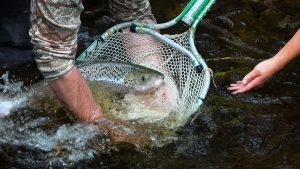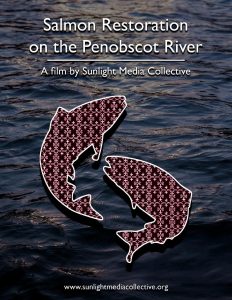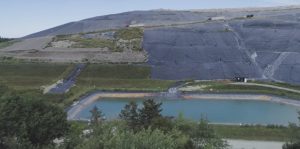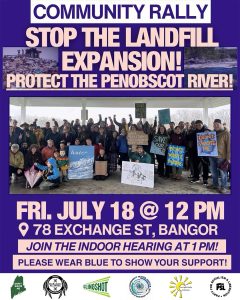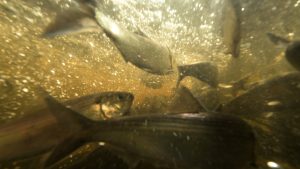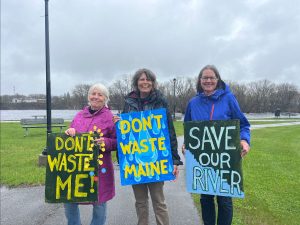Senate Scheduled to Vote Wednesday
On Tuesday, the Maine House voted 80-65 to reject Governor Mills’ proposal to rollback state environmental protections to pave the way for the state’s preferred siting of an offshore wind port on Wahsumkik/Sears Island within the town of Searsport. The Senate is scheduled to vote Wednesday, April 10th.

LD 2266 “An Act Regarding Offshore Wind Terminals Located in Coastal Sand Dune Systems,” seeks to exempt a sand dune on Wahsumkik from current state environmental protections to explicitly allow for the advancement of an offshore wind port and staging area on the island. Governor Mills announced last month that Sears Island is the state’s “preferred site” for the major development, instead of the already industrialized Mack Point, also in Searsport. Mills has called the site the “most cost-effective.”
There has been no environmental impact study done on the island for the project and no environmental assessments that have been made public. Wahsumkik is the largest uninhabited island within the state and one of the largest on the eastern seaboard. During past attempts to develop the island, a number of environmental assessments have underscored the importance and vulnerability of the island’s intact ecology. The Nature Conservancy’s “Resilient Land Mapping Tool” demonstrates that the over 70 acres of mature forests and wetlands on Wahsumkik, that would be removed for the wind port, currently sequesters between 80-110 tons of carbon per acre per year. Opponents to development point to the Intergovernmental Panel on Climate Change report that states retaining intact ecosystems are essential for climate resilience. Construction could also impact marine eel grass beds and migratory bird patterns.
The destruction of a sand dune within the proposed development site was reportedly missed in a first assessment of the site, thus prompting the Governor’s quickly introduced bill. The dune is one of only three in the region. It is not man made, as some proponents of the development have stated, but is the ecological response to a jetty built decades ago.
At the public hearing, both Rep Lori Gramlich of Old Orchard Beach and Audubon Maine stated that regardless of how a sand dune develops, it is still protective of the coast and requires protection.
Several Representatives spoke on the floor, both for and against LD 2266 prior to Tuesday’s bi-partisan rejection. Those supporting the Governor’s bill spoke about the urgency of wind energy development and the necessity of environmental trade offs. Local Searsport Republican Representative Reagan Paul spoke passionately for the conservation of Sears Island and local Belfast Democratic Representative Jan Dodge brought forward information she had gained from a local information forum with a member of the Climate Council on environmental impacts and the viability of Mack Point.

Passamaquoddy Representative Aaron Dana spoke in opposition to LD 2266. He said, “The installation and operation of an offshore wind port at Wahsumkik Moniq, sears island, [would] encroach upon sacred sites and areas of cultural and historical significance..”
“This body just passed an act to review state lands and water ways that have sacred, traditional and other significance to the Wabanaki people, LD 1349! Wahsumkik is one of these said lands and should be taken into consideration.”
“This place holds deep spiritual value for the punowamsqewik and protecting the land is integral to our Tribes’ cultural identity. The industrialization of sears island not only desecrates our sacred spaces but also erodes our cultural heritage and connection to the land.”
“The push for Sears island permitting and construction,” Dana concluded, must be critically examined from a Native perspective, taking into account the profound impacts on our environment, culture, and communities. Alternative approaches that respect Indigenous rights, prioritize conservation, and foster sustainable development are essential for a more equitable and harmonious future…please follow me and vote“ought not to pass” and look for a better environmental protection partnership between Tribes and state by not desecrating our state’s rich beauty and sacred lands.”
The Penobscot Nation has not asserted a formal position on the location of a wind port, but has expressed opposition to the lack of process and meaningful consultation with the Tribes, and concern about cultural and environmental impacts.
Some citizens of the Penobscot Nation have been vocally opposed to the development of Wahsumkik and the bill that would roll back sand dune protections, including Penobscot citizen and climate activist Sherri Mitchell. She is an Indigenous rights attorney and the founding director of the Land Peace Foundation, an organization dedicated to the global protection of Indigenous land and water rights and the preservation of the Indigenous way of life.
“What is happening here is a misuse of the assertion of urgency combined with a recklessness that is actively dismantling environmental protection. This is a very dangerous precedent for Maine. Allowing any place to be listed as “exempt” from environmental review sets every place up to be targeted. This exemption won’t just benefit this one project, it will set precedent for any industrial actor to come in and claim exemption.”
“There is another site available that is preferable and uncontested. The other site located on nearby Mack Island is already in industrial use and it would benefit from the project. And, if urgent expediency is truly the concern, this alternative site is far superior. Studies that were conducted by the State of Maine demonstrate that the other site [Mack Point] can be developed faster and without the destruction of a pristine landscape. Attempting to destroy Wahsumkik/Sears Island, a place well-loved by all the local citizens, while refusing to be forthcoming about the immediate and long-term impacts, refusing to engage in any type of consultation with the Tribes, AND while eliminating critical environmental protections for Maine’s coastline takes us down a very slippery slope that puts all beloved places in Maine at risk.”
“This is not about whether you support wind energy. This is about the very dangerous precedent being set by eliminating environmental review and protections and the unnecessary destruction of Maine’s tidal shores.”
Darren Ranco, spoke with Sunlight Media Collective last week. He is a Penobscot Nation Citizen, Chair of Native American Programs and Professor of Anthropology at the University of Maine and a Penobscot Representative to the Maine Indian Tribal State Commission (MITSC). He is also on the Equity Subcommittee and the Natural and Working Lands Working Group on the Maine Climate Council:
“I don’t understand why there’s this kind of last minute urgency, this exempting environmental review. I think that even identifying Sears Island, as the Governor did a few weeks ago, without a real direct set of discussions with the Tribes, I think that doesn’t reflect a healthy relationship in terms of communication. So that concerns me.
Sears Island is a really important cultural site.”
“It’s important for a bunch of reasons for both Wabanaki people and non Wabanaki people. It has a great amount of history. It’s ecologically sensitive and important to the ecosystem of our coast. And there’s a reason why the large majority of that island is under a conservation easement. It is a delicate ecosystem. To put any development through without some sort of review of how this fragile ecosystem would be impacted, just strikes me as really suspicious. To do it when the offshore wind development itself is years away, in terms of even where this is going to be built…I’m deeply concerned with this approach and I think more consultation is needed, especially with the Tribes. But I think the people who care, who are stewarding Sears Island, who are non-Native, are also deeply concerned that this feels very last minute, out of the blue and unnecessary to rush it in this way.”

Photo by Sunlight Media Collective.

Photo by Sunlight Media Collective.

